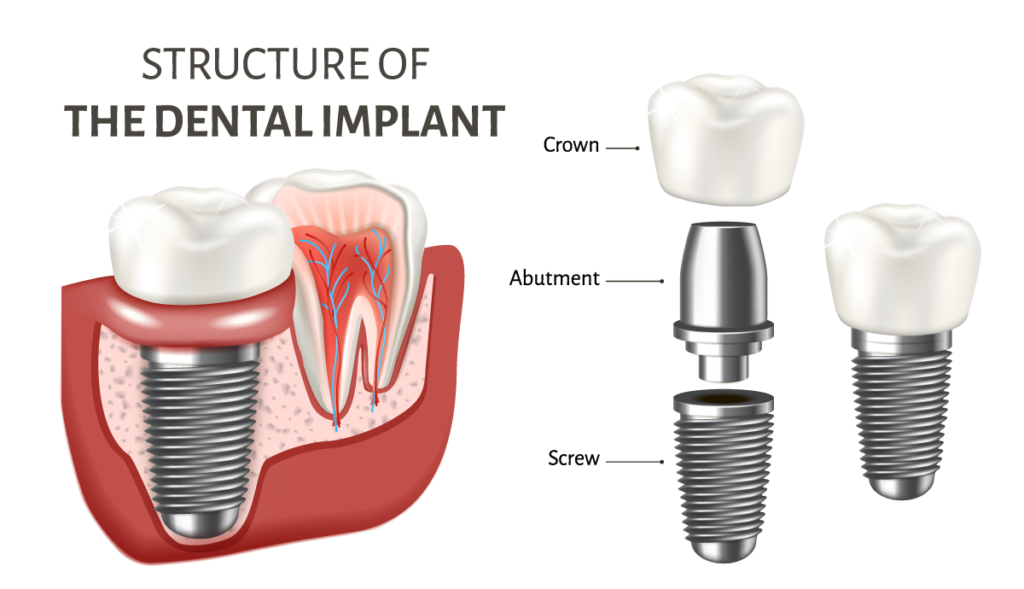Sometimes tooth decay or gum disease becomes so severe that a tooth is unsalvageable. In past generations, the only tooth replacement options people had were bridges, crowns, or conventional dentures.
Today, many people want a more permanent, long-term treatment plan that provides better oral health and function for a lifetime. Dental implants replace missing teeth and feel, work, and act like natural teeth.
What Are Dental Implants?
Artificial tooth implants have a titanium anchor piece. The visible part, or crown, of the implant is made of zirconia and looks like a natural tooth, matching your other teeth.
The replacement teeth you receive with a tooth implant do not experience decay, but they can be compromised by poor gum health. You will still need to keep up with oral hygiene and professional cleanings to keep your mouth and gums healthy to help your teeth implants last a lifetime with proper dental care.
Single Tooth Implants VS Implant Supported Bridge VS Overdentures VS Hybrid Denture
Tooth replacement options include a single tooth implant, multiple single implants, a tooth-supported bridge, or implant-supported dentures.
Some people only need one tooth or several teeth replaced so multiple single implants may work well. If you lose more than a couple of teeth, a consultation to plan out the best restorative options is the best place to start. We will discuss if implants are a good choice, how many implants, or if there is a more beneficial option depending on your case.
An implant supported bridge involves at least three teeth in a row. The ones on either end attach as implants with the center tooth/teeth acting as a pontic that connect the implants at either end.
Overdentures are a full set of dentures that anchor to the jaw with several implants. The denture is removable and cleansable.
A hybrid denture is usually a zirconia or porcelain full arch prosthesis that is torqued down to the supporting implants. It is not removable by you at home. You must visit a professional regularly for maintenance.

Implant Surgery Process
The tooth implant procedure often involves a tooth extraction and surgical implant placement. We remove the decayed tooth, place a bone graft and allow the bone in the surgical site to heal. During this healing time, you will either leave with an edentulous space or we will fabricate a temporary prosthesis if it is an esthetic area of your smile.
When your mouth has healed from your tooth extraction, we will numb your mouth and perform the dental implant surgery to place the metal screw portion of the new tooth in your jaw. At this stage, the dental implant has been placed but it needs to heal to integrate to your jaw. The healing time is usually 2-3 months. After this final phase of healing, we take an impression of the site to have a crown fabricated. This crown will be screwed or cemented into the implant through an abutment. The abutment is a metal piece that connects the crown to the implant located in your jaw bone. Bone will grow around the new artificial “tooth root” to support and fasten it firmly—this is called osseointegration.
What Are the Pros and Cons of Dental Implants?
Every treatment approach has its pros and cons. It is important to talk with your dentist about what option is best for you.
Cons of Implants
Challenges with dental implants depend on the type of implant you have, whether you had bone loss, your overall health, and other factors. Some of the main disadvantages of dental implants include things like healing time, temporary pain during recovery, potential infection, and upfront expense.
Are Dental Implants Painful?
Dental implant surgery is not painful because we numb your mouth with local anesthesia. You only feel some pressure. Of course, if you are nervous, talk with us about other medications we can administer to make your surgery even more comfortable for you at our dental office.
Tooth implant pain during recovery can be relatively mild if you only have one implant and healthy bone. You will eat soft foods, apply ice, and avoid using a straw for a time. It is similar to the recovery from other dental procedures like an extraction or wisdom tooth surgery.
If you had multiple tooth implants or a complex case, the discomfort and healing process may be more involved. However, we will provide medication and instructions to help you manage any pain you may experience, supporting you every step of the way.
Pros of Implants
Advantages of dental implant surgery include improved oral health, less bone loss, ability to eat a regular diet, and better overall health over time. Because dental implants facilitate people eating healthy foods, they can be a great boost to overall physical and cognitive health and longevity.
Implants prevent bone loss that could happen with tooth loss and preserve your youthful facial appearance and bone structure. They also help to maintain healthy neighboring teeth.
With implants, you have no worries about dentures slipping or time-consuming maintenance routines. Overall, dental implants have a 95% success rate.
How Much Do Dental Implants Cost?
Tooth replacement cost depends on a variety of factors such as whether you need bone grafting, how many teeth you are replacing, and which implant you choose.
- A single tooth implant cost is about $3000-$5000 per tooth.
- Overdentures cost about $9,000-$12,000 for the whole mouth.
- Hybrid dentures cost about $35,000-$55,000
Many insurance providers cover some of the cost of dental implants. Check with your insurance or your dentist for an estimate of your cost.
Ready to Find a Dentist Who Can Do Dental Implants Near You in Columbia, SC?
At our dental practice, we have years of experience in implant dentistry and cosmetic dentistry. We would love to talk with you about whether dental implants are the best choice for your dental health and help you decide which dental services fit your goals.
